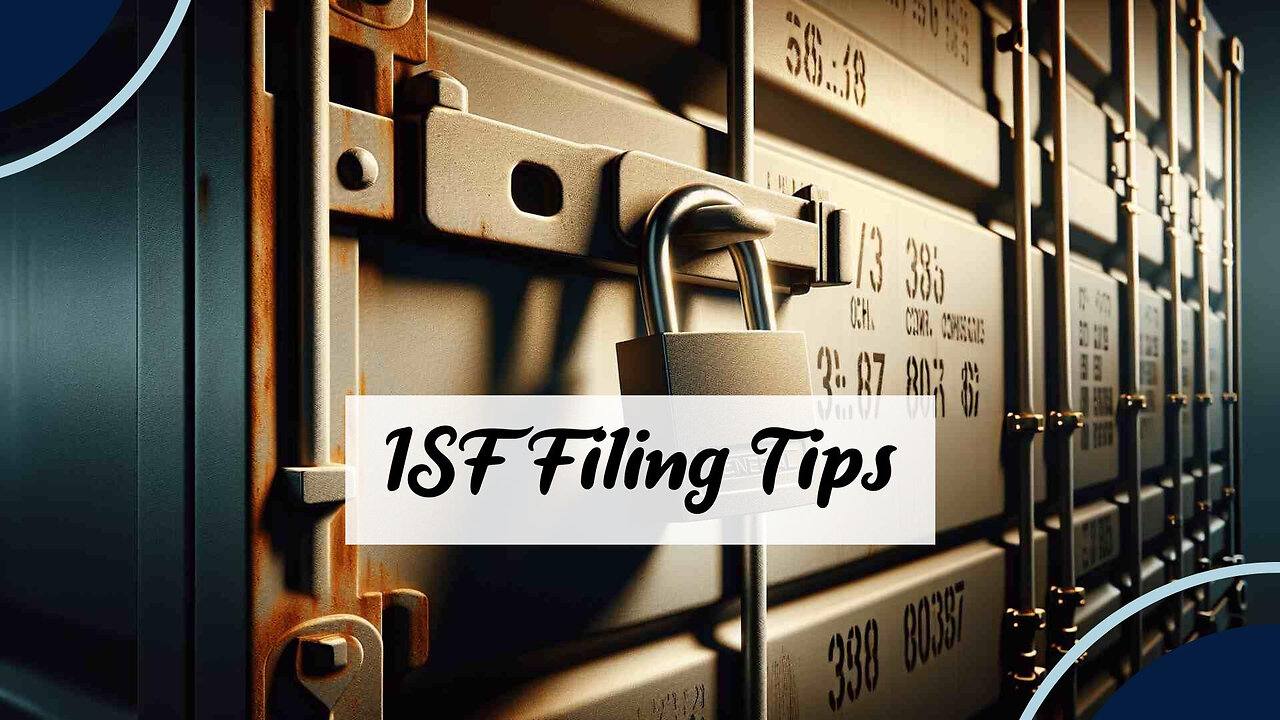Premium Only Content

Maximizing Trade Compliance: Mastering the ISF Filing Process
ISF Depot // 661-246-8217 // customs@isfdepot.com // www.isfdepot.com
In this response, we deep dive into the best practices for a robust trade compliance program focusing on Importer Security Filing (ISF) filing. We start by introducing ISF filing and its significance in ensuring the security and efficiency of international trade. We then highlight the importance of ISF filing compliance, emphasizing the potential penalties and risks associated with non-compliance. Next, we discuss the essential elements of an effective trade compliance program, including internal procedures and controls, knowledge and expertise, risk assessment, and regular audits and reviews. We emphasize the collaboration with trusted customs brokers and the utilization of technology for efficient ISF filing. Lastly, we emphasize the need for continuous improvement and adaptation in trade compliance programs to keep up with evolving regulations and industry practices.
#usimportbond #isfcustomsbroker #uscustomsclearing #isfentry
Video Disclaimer Here: This tutorial is independent and not affiliated with any US governmental entities.
00:18 - Importance of ISF Filing: ISF filing is crucial for importers to ensure security and efficiency in international trade and compliance with U.S. Customs and Border Protection regulations.
01:09 - Key Elements of Trade Compliance Program: Establish internal procedures and controls, stay updated on regulations, conduct risk assessments, and implement regular audits and reviews to maintain compliance with ISF filing requirements.
02:20 - Collaboration with Customs Broker: Working with a licensed customs broker can enhance trade compliance by leveraging their expertise in ISF filing and navigating complex customs regulations.
02:40 - Embrace Technology: Utilize automation tools and software to streamline ISF filing processes, improve accuracy, save time, and reduce the risk of errors. Continuous improvement and adaptation are necessary to stay compliant with changing regulations.
-
 28:39
28:39
The Why Files
3 days agoCryptids Vol. 4 | Bunyips, Yowie and Australian Nightmare Fuel
26.1K38 -
 1:07:06
1:07:06
Mike Rowe
18 days agoThe Fight For America's Heartland | Salena Zito #442 | The Way I Heard It
19.4K44 -
 2:43:30
2:43:30
TimcastIRL
4 hours agoSouth Park Goes FULL CHARLIE KIRK, Latest Episode ROASTS Trump Again | Timcast IRL
186K63 -
 LIVE
LIVE
SpartakusLIVE
4 hours agoThe Return of the KING of Content
468 watching -
 10:05
10:05
MattMorseTV
7 hours ago $0.64 earnedHe actually did it...
34.5K17 -
 1:32:39
1:32:39
Anthony Rogers
1 day agoEpisode 376 - Todd Schowalter
12.5K -
 LIVE
LIVE
megimu32
3 hours agoOTS: Movie Tie-In Games + Remakes: Let’s Play Memory Lane
227 watching -
 1:15:06
1:15:06
Adam Does Movies
11 hours ago $0.02 earnedTalking Movies + Ask Me Anything - LIVE
14.9K -
 1:17:18
1:17:18
Glenn Greenwald
1 day agoWhat are CBS News' Billionaire Heirs Doing with Bari Weiss? With Ryan Grim on the Funding Behind It; Europe Capitulates to Trump Again | SYSTEM UPDATE #494
102K73 -
 1:43:49
1:43:49
RiftTV
5 hours agoCNN Calls Black NY Shooter WHITE, Cincinnati FATIGUE | The Rift | Guest: Braeden Sorbo, 2Protects1
45.4K14